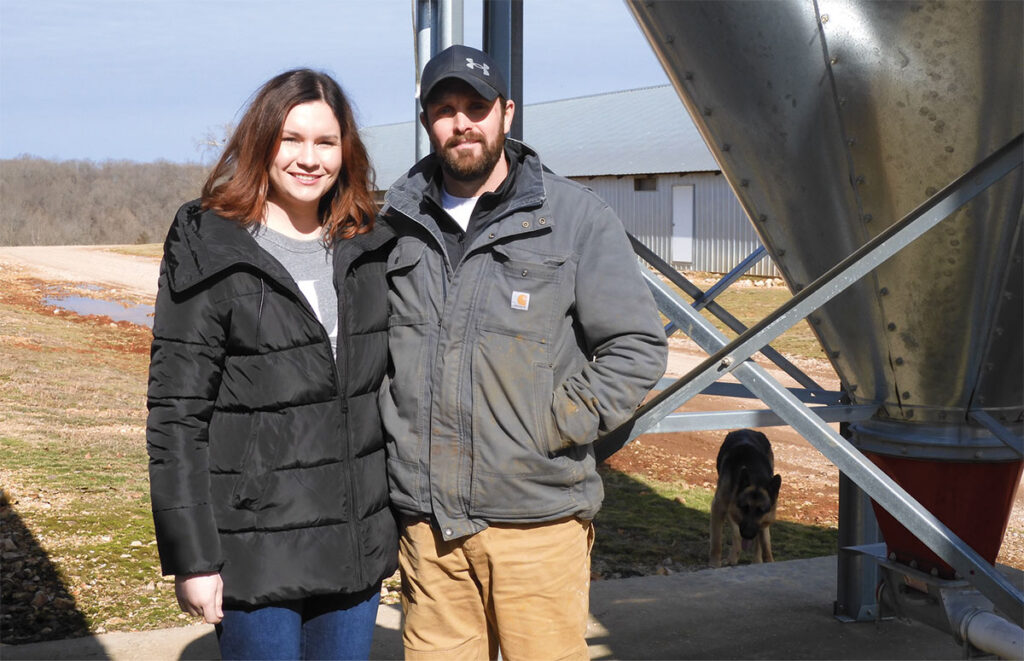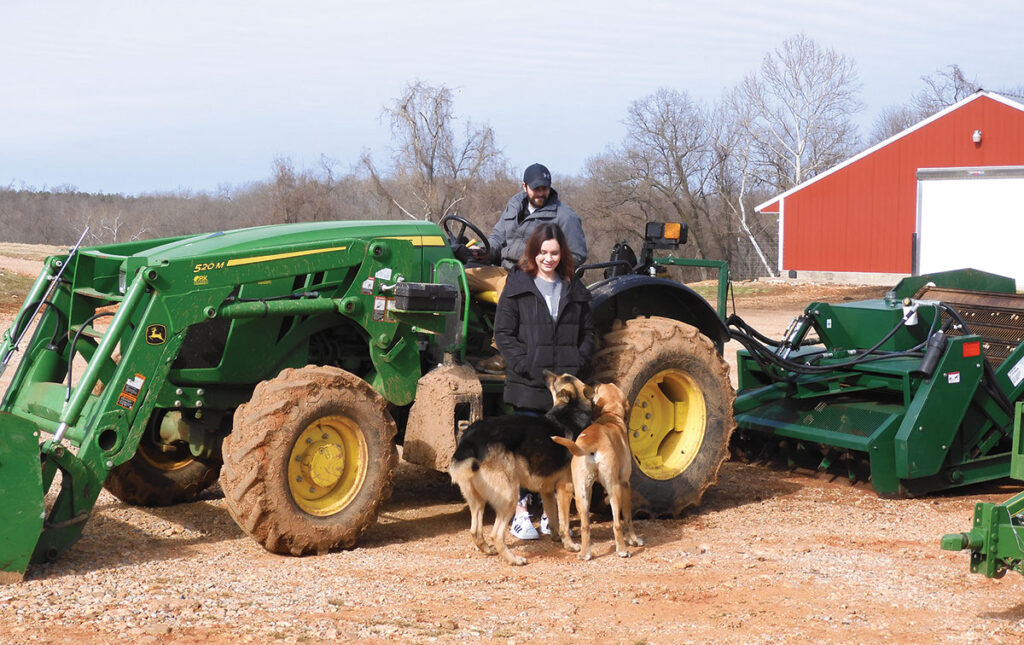
Couple relocates so they can expand their operation
HINDSVILLE, ARK. – Sometimes grandparents are the beacons shining light down career paths. Grandparents were that beacon for both James and Ashton Dixon of Hindsville, Ark.
James’ grandparents Bobby and Joyce Hanson had a farm very near the young boy’s home in Magnolia, Ark. They raised chickens and cattle, and 50 years later are still raising chickens. James was one of a set of twins and clearly remembers one Christmas when his grandparents took them to an unused chicken house to see newborn twin calves. The coincidence charmed young James. Though he never became attached to the calves and they were sold at auction as usual, his grandfather’s chickens caught the young boy’s fancy rather than cattle.
Similarly, Ashton was raised in Magnolia and lived near her grandparents Allen and Betty Vann where they raised chickens in coops, as well as rabbits. Ashton joined 4-H and showed chickens. She remembers once receiving broiler eggs from the state as part of a program to inspire children to participate in the showing with one of those chickens living for a surprising 10 years. One of Ashton’s favorite activities during her young years was to watch chickens hatch in an incubator.
James and Ashton lived in the same small town, went to the same school and their families knew each other. However, the couple never met because Ashton was six years younger. They have now been married for three years.
James purchased his first farm in 2013 in Magnolia, a five-house Tyson chicken farm on 40 acres. Choices were limited, but James knew he wanted to expand someday in the future and selected a farm with more recently built houses. When the time for expansion came, James discovered a policy in the Hope Cooperative that capped flock size at 120,000, and he was already slightly above that limit. He decided expansion was more important than location, and the couple decided on Northwest Arkansas because a more diverse environment so their children would be prepared for multiple careers anywhere from New York City to rural America. As a result, James reached out to Dan Danschwiender, owner of Twin Oaks Realty, a nationwide company. Dan then put him in touch with Northwest Arkansas agent Clay Osbon from Huntsville.
“Clay found a 44-acre farm with six houses in Hindsville already under contract with George’s for us,” James said. “Once again, a critical factor was newer houses. These began production in 2014 and met that criterion. Now my flocks run 168,000 and I hope to expand again sometime in the future.”
Taking advantage of a bonus resulting from the recent nursing shortage, Ashton moved to the region before James in January 2021 to work at a surgical center near Washington Regional Hospital. She soon shifted to the hospital because the need was so great.
James joined Ashton in March when the couple moved into their home on the property. James worked the first flock by himself but discovered he didn’t have enough time to mold the well-maintained farm to his own preferences, consequently hiring help for the second, third and fourth flocks. He is now working the fifth flock by himself.

“Having help at this point is not worthwhile because I am still making changes in trying new things in regards to water treatment, lighting and housing conditions,” James explained. “Later, when I have found what works best, I will hire help.”
James was awarded the 2021 Arkansas Farm Bureau Young Farmers and Ranchers Achievement Award and views raising chickens as a highly inter-related system where balance among all of the components and constant attention to detail is essential for optimum production.
“My grandpa always said, ‘It ain’t hard, but there’s so much of it,’ and he was right,” James said. “I make a daily list and use it with each house because by the fourth house I may need it to remind me of each task I need to do that day. Constant repetition can cause unintended inattention leading to decreased production. My daily list keeps me on task.”
Initial production levels dropped. One factor was chicken breed. Tyson used Cobbs and George’s uses Rosses, with each having slightly different needs to get the best out of the species in terms of overall health including bones and, feed efficiency. The farm runs off one pre-existing well backed up by rural water. A major component in developing and providing an optimum environment for chickens is reaching and maintaining the perfect pH level in disinfected water. A clean environment is maintained by using dry bleach foot powder before entering the house as well as maintaining external rodent stations and insecticide application. The houses were built to handle rapid temperature extremes and proved successful by this year’s varying winter weather.
“I had a very successful career with Tyson and appreciate George’s quick response to a farmer new to the area,” James said.
James’ chickens are raised to 7 pounds in 49 to 51 days with the farm’s annual five-flock production cycle predicted to be 57 million pounds. While the houses were not ready for clean out when James took over, he anticipates selling 900,000 pounds of litter as part of the farm’s overall financial profile on the upcoming first cleanout.
The couple has found a church home at New Life Church in Fayetteville. Additionally, James is on the Madison County Farm Bureau Board. Starting the new farm has been extremely time intensive and he has not made as many meetings as he would like but plans to rectify the issue in the near future.
“We really love it here and look forward to raising our family here where opportunity and family activities abound,” Ashton said. “However, as the old adage says, ‘you never say never’ and we are always open to better opportunities.”







